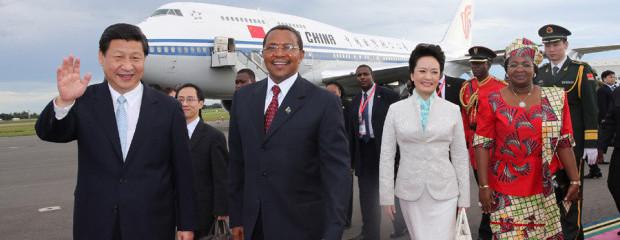In Tanzania, we need to talk about China – By Erick Kabendera

 If Tanzania’s founding father, Julius Nyerere, were still alive today, he would surely be considering withdrawing the speech he gave in 1965 when he was famously stated that “it is not China policy at all” to use its economic aid to exploit Africans.
If Tanzania’s founding father, Julius Nyerere, were still alive today, he would surely be considering withdrawing the speech he gave in 1965 when he was famously stated that “it is not China policy at all” to use its economic aid to exploit Africans.
Over 50 years later, the Chinese are no longer searching for a possible railway route to link up the Zambian copper belt with the Tanzanian coast. But they are still here and currently engaging in a process of frantic foraging for the country’s natural resources.
Investments such as the 532 km natural gas pipeline linking the southern Tanzanian gas fields to the country’s biggest city, Dar es Salaam – financed by the Chinese government-owned Export-Import Bank to the tune of $ 1.2 billion – show that the Chinese are here to stay.
In the past few months, the country has learnt a few things about Chinese operations in Tanzania. These include a deep involvement in elephant poaching; Chinese businesspeople being ushered through airport security points without inspection; Chinese business gurus driving straight to State House to sign a deal to repair an airport in exchange for a mining site, and UN allegations of Chinese companies smuggling gold from DRC through Dar es Salaam with the help of corrupt customs officials.
On top of that, the Communist Party of China seems to be renewing its close relationship with Tanzania’s ruling party, Chama Cha Mapinduzi, which has remained at the helm of power since the country’s independence in 1961, with the aim of using the party to influence investment and trade decision-making.
Not only have visits of CCM officials to China, and vice versa, increased in frequency, but the Chinese Ambassador, Lu Youqing, late last year went as far as accompanying CCM officials on a regional tour in Shinyanga where, at a public rally, he pledged continued support to help the ruling party implement its election manifesto.
Whereas the government insists that the gas pipeline will help to reduce electricity shortages, much doubt hangs over the actual cost of the project, and whether Tanzanian taxpayers will repay the (apparently overpriced) loan for the project. As is fairly common across the continent, where contracts signed between the Chinese and African governments are considered top secret, not even local MPs have seen what the contract for construction of the pipeline looks like.
A parliamentary oversight committee on Public Accounts summoned the Tanzania Petroleum Development Corporation (TPDC), a para-statal responsible for implementing petroleum exploration and development policies on behalf of the government, to provide it with the contracts last year, but the corporation said that its parent Energy and Minerals ministry still had them in its possession. Before the committee could summon the ministry to provide the contract, the Speaker’s office reportedly intervened and halted the move.
The Chinese government is estimated to have provided $2billion in loans last year alone for various projects, ranging from building a convention centre to a government information system. Yet, a distinct lack of transparency has raised rumours in political hallways and amongst interested spectators that two natural gas blocks – originally reserved for TPDC in order to experiment different exploration approaches – might be awarded to Chinese companies outside the competitive tendering process.
Such episodes, together with the level of political corruption and impunity amid such developments, makes many ordinary Tanzanians wonder whether the ongoing discoveries of hydrocarbons will help Africans reduce poverty and eventually put to rest their leaky begging bowls.
In the light of the secrecy surrounding the contracts signed between African countries and multinationals, it is clear that the ordinary poor peasants will bear the brunt – much more so than the political leaders who sign such agreements with their own interests in mind.
That is why right now it is important that we know the names of politicians and civil servants who have stashed away money in offshore safe heavens and Swiss bank accounts. Conventional wisdom has it that political leaders and technocrats who travel to China to sign such contracts may negotiate a deal, top up their cut and ask for China’s help to put it in a bank account abroad for them.
This isn’t to say that Western countries and their big corporations coming to invest in natural gas exploration and development are totally clean. No! Recent corruption allegations facing British oil and gas investors, despite signing the most rigorous anti-corruption laws back in their own countries, have left people wondering if their motivation is different from their grandfathers whose dehumanising past activities left the continent already bleeding.
The key to the debate is the question whether China is a truer friend for Africa than the West. This point must now be properly debated as the people look up to their leaders to use newly-found resources to make an historic transformation to their country.
Erick Kabendera is a Tanzanian freelance investigative journalist. Tweet him @kabsjourno




To be honest, investigative reporting is not a piece of cake even for Western journalists who enjoy cultural, educational, legal, financial, and technological advantages over their African counterparts. Therefore, it won’t be fair to come hard on you for not backing your allegations with concrete documentation. Besides, we all know that China is hardly a nation praised for its rule of law.
The real, heartbreaking threat China’s voracious, almost sickening appetite for ivory pose to our elephants, however, doesn’t need anymore evidence to worry us deeply.
Having said that, on other economic and investment fronts, I do think the accountability has to come mostly from our own African representatives. There is no doubt that their activity need to be scrutinized closely, but not necessarily with exaggerated suspicion. After all, the Chinese are driven mostly by a new found capitalist frenzy, not a deep rooted condescension of Africans like the Europeans were.
But when it comes to the brutal slaughter of our elephants, the Chinese should be confronted without reserve!
[…] If Tanzania’s founding father, Julius Nyerere, were still alive today, he would surely be considering withdrawing the speech he gave in 1965 when he was famously stated that “it is not China policy at all” to use its economic aid to exploit Africans. […]
Notwithstanding a reference to a parliamentary committee, there is very little here that highlights Tanzania’s role of responsibility.
First it was colonialists (and their grandchildren) and now the Chinese. Nowhere is anyone on the continent proper to blame, apparently.
In those former colonial states, do you think that their development was one of peace, prosperity, and equal development. Admittedly Africa was exploited, but perhaps a brief glance at European and British history would show that the leaders there were often despotic, and exploitative, wiping out and persecuting any number of their own subjects.
Similarly, the Chinese come in paying poor wages, but these are the same wages they pay back in China.
None of this would justify colonial-style exploitation today, (however temporal law would argue that it was deemed a norm at the time); however, China is coming in as a rational state actor – albeit with massive wads of money – but now it’s time to blame them for the poor oversight structures in place?!
It would be nice for once if Africa would present a united front for the right cause – a common tariff/trade union for example; 54 countries united are far more likely to present a cogent “China policy” in response to Beijing’s “Africa policy.” But in the mean while the AU would rather busy itself with bleating about the ICC who are legitimately investigating atrocities.